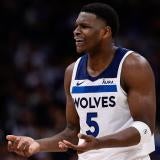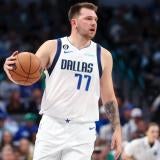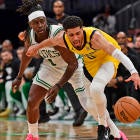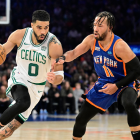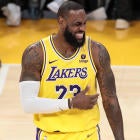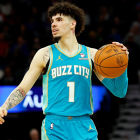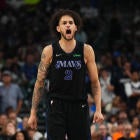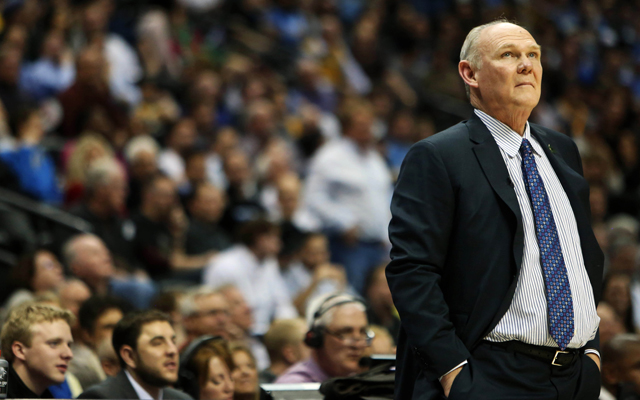
George Karl is fighting battles on a lot of fronts.
He has battled cancer into remission. Twice. He has battled the NBA lifestyle for 30 years. He's battled a superstar wanting out of town. Now he's battling the reputation that he can't get out of the first round, that his team can't win without a superstar, that you can't play fast in the playoffs, that his whole philosophy is wrong.
And for a guy who was once called "Furious George," Karl is pretty laid back about it all.
-----
Karl's office is a disaster. My wife would go bananas organizing everything in his office, from the stray pens, paper, notes, paper clips and binders to the paraphernalia, whiteboards and kids drawings. The soon-to-be 62-year-old moves some stuff off a leather seat for me to sit, then plops down behind his desk.
He holds up what looks like a phonebook, printed with a three-hole punch. On the front the Denver Nuggets logo shines.
"You see our scouting report for the Warriors?"
The binder thumps on his desk like a dead weight.
"You'd love all this."
Karl knows me as the guy who lobs questions about metrics at him during pregame press conferences, tossing out synergy ranks and offensive efficiency metrics after the day-by-day guys have nabbed their sound bytes about feelings. Sometimes Karl finds the information useful. A lot of the time he shakes his head at some of the numbers I "come up with."
I would, in fact, kill for a look at that scouting report. That's why I've come. I'm here to talk to a legendary NBA coach with over 1,100 wins on the eve of Game 1 of his first-round series vs. the Warriors, and to find out how a playoff series battle plan is put together. The conversation covers larger themes and ideas, but what's directly in front of him can't be ignored.
The massive binder in front of him, though he appreciates the data, holds mush that will be ignored.
"I'll probably read, maybe, a third of this," Karl says. "It's too much!
"You need maybe a five-minute segment at your meetings every day on maybe what you're doing well and kind of what's coming out on the radar screen statistically."
What's odd is that Karl's actually further on the progressive front than most coaches, and more than he used to be.
"I'm definitely more engaged in it than I used to be. I think there's just a lot more involved in it for the coach. Players use it against you, and agents use it against you, everyone can use it against you. I'm a big believer that you can use a stat to tell whatever story you want."
-----
But there is one number that has told the story of Karl's career for the past 23 years. Pace.
Karl is known as the modern-day master of the fast-paced offense. There are others, including those Karl has borrowed from. Mike D'Antoni for one. But Karl has been pushing a particular style in the NBA for 30 years. Interestingly, Karl traces the roots of his coaching philosophy to his time when he wasn't in the NBA.
Twenty-three years ago, Karl returned to the Continental Basketball Association as coach of the Albany Patroons after a year in Spain coaching Real Madrid. At age 39, Karl did what a lot of people do in their careers. He sat down to take stock of what he wanted to do with his professional life.
"I was in Albany, New York, and I decided to re-evaluate my career in terms of what I wanted to do.
"I wanted the game to be fun again. The game was getting kind of stale. I wanted to go to the gym and have fun and feel like it was fun teaching.
"That's kind of where I turned the corner to almost going completely back to Carolina basketball," he says of the style he learned as a player at the University of North Carolina under Dean Smith. "Playing a lot of guys. Being aggressive at both ends of the court."
The approach Karl formulated would pay off in the Patroons going 50-6, setting a record in the CBA. Karl would re-join the NBA as coach of the Seattle Sonics in 1991 and set off the most successful era of his career, culminating in a Finals appearance in 1996.
Karl's known nowadays as an offensive-centric coach, and his teams have consistently landed in the top 10 of offensive efficiency more often in his tenure than in defense. But for Karl, the big key to his approach was to instill a trust in the players (which players love) that allowed him to guide them defensively.
"The thing about playing fast offensively is that I think it allows you to emphasize defense," he says. "Because you let them have the freedom a lot offensively. And coaches don't give freedom away very easily. I think as a coach, someone told me you can't coach intense at both ends of the court. Your team's going to know what your favorite side of the court is.
"But when you play fast, you say 'That's your game, I'm giving you that side of the court,' but you've got to do what I want you to do defensively. But at the same time you can coach freedom and what a good shot is."
Karl's approach is often criticized because of the chaos it inspires. Players have concepts, vague ideas, but are allowed to freelance when it comes to feeling out the best play. That it works as well as it does is a testament to Karl's ability to translate ideas to function.
"We don't coach maybe the execution of a play," he says. "We teach spacing, but we don't work on the timing of flare screens and the timing of staggers. And we don't spend a lot of time on the tricks of screens or the tricks of execution sets. We talk about spacing and we talk about getting into the paint. I actually think I coach what a good shot is as much as any coach in the NBA."
That "good shot," if you play the percentages is, in order of quality: 1) Dunks or layups; 2) free throws; 3) corner 3-pointers; 4) above-the-break 3-pointers, and then somewhere near 5,472 mid-range jumpshots. The Nuggets led the league this season in points in the paint and shots in the restricted area, were fifth in free-throw rate, eighth in corner 3 attempts (in a season they were not great at shooting 3s), 27th in above-the-break 3s and second-to-last in mid-range jump shots.
They were fifth in offensive efficiency. And maybe the more important metric, they were 11th in defensive efficiency, eighth since Feb. 1.
Karl likes those numbers because they confirm what he thinks and wants, even if so many of the numbers in that binder wind up being ignored.
-----
Nonetheless, Karl will go through the binder and use the information within. He'll study the shot charts of the Warriors to see what their tendencies are. He'll read the in-depth reports from Synergy Sports on Stephen Curry, Klay Thompson and David Lee. Some of the information will be disseminated to the Nuggets. Most of it won't be.
Karl is a big believer in the time-trusted idea of not changing your entire approach based on matchups. You did something to get you here, so you must have had some measure of success. And Karl thinks flooding players with too much information only causes problems.
"I'm so into keeping it simple," he says. "We've gone longer in video meetings, we'll go longer in personnel meetings, but tomorrow night, we're not changing concepts. We have priorities, but we have priorities every game, too. The priorities have been drilled a little more."
Karl says he'll give the Nuggets four to five priorities on both defense and offense, but most of the offense is general concepts they've already established.
He says he and his staff will spend Friday night before Game 1 watching Curry's last 80 possessions. Curry, who "scares the hell out of" him with his ability to shoot from anywhere, especially pull-up jumpers in transition, a particular weak-point for the Nuggets' defense.
But for Karl, much of this series and his approach in these playoffs comes down to trusting a team that won 57 games, lost only three games at home and somehow managed to exceed skeptics' lowest ceilings but nearly meet the grandest expectations.
"For this team to go through Ty (Lawson) going down (with a plantar fascia tear), (Danilo Gallinari) going down (ACL), Kenneth Faried going down and not losing a key game? I've got to trust them. Did we get lucky? Did we win in Milwaukee ugly? Sure. But did we win? And they believe. So I'm not trying to get any heavy thing on them which makes them not believe."
Karl knows a little bit about people not believing.
-----
The standard narrative/storyline/talking point for media when discussing the Nuggets is the lack of the proverbial superstar, a point beaten to death night after night no matter how many superstar teams the Nuggets knocked off in the regular season, because "the playoffs are a different beast."
There are some valid points there. Outside of the 2004 Pistons, you can't find a championship team over the past 40 years without a superstar.
People doubt a team that plays fast can win in the playoffs, because the pace slows down in the playoffs. This is a little bit trickier. The Heat are employing a defense-creates-fastbreak system that wreaks havoc on teams. The Western Conference Finals last season featured the fastest paced and fifth-fastest paced team in the playoffs. But the standard over time does persist.
Karl's used to the skepticism, though. And in a media that has the memory and attention span of a gnat, it's often forgotten that Karl's style was criticized when he was in Seattle as well.
"I remember a few times speaking to a couple NBA guys about what we do, and about attacking before the defense sets and what we're trying to get. And so many coaches think you gotta have one low post presence to win and you can't speed the game up in the playoffs.
"Why am I going to play like everybody and not win? I can't win playing against Shaq or playing against Tim Duncan playing their way. You can if you get lucky, but ... But in Seattle, we did a lot of things outside the box. We double-teamed a lot. People said we'd double-team a Coke machine.
"People said you couldn't do that in the playoffs either. 'If you give us time in the playoffs to prepare, we'll beat it.' Well ... "
Karl shrugs and that seems to epitomize where this Nuggets team is. Ask Andre Miller if this team can win a title, and he expresses doubt. No superstar. Yet in 24 hours he'll lead the team to a Game 1 win by playing superstar ball in the fourth quarter. Ask Andre Iguodala if this team can win, and he'll scrunch his face like he's trying to figure out a math equation. Too young, even as rookie Evan Fournier and Ty Lawson both come up huge the next day.
The Nuggets don't seem to know if they really are contenders without a superstar, but none of them is willing to lie down. And they just keep winning.
The Nuggets have flourished since trading Carmelo Anthony, and they play what many think is the most entertaining brand of basketball in the league. But the first-round series still hangs over his expectations like a scythe. Playing fast and passing without a superstar is fun. Winning is more fun.
But Karl believes, as all coaches do, in what he thinks is the right way to play, the best way to pursue success.
I ask Karl a question to test his conviction.
Would he rather lose with this team he's constructed, full of young guys who share the ball, move constantly, and run, than go one round further with a ball-stopping, isolation heavy offense built around a superstar? Would he rather "go down swinging?"
He pauses, smiles, and leans back for a moment.
"Yeah," he says. "And I think in time, the game's going to come our way. I think the game's going to go away from the isolation game. "
-----
Karl's conviction is a philosophical one, a byproduct of his new attitude afforded by his second bout with cancer. Karl knows all too well the high cost of the NBA coach's lifestyle. The stress, the physical wear and tear, the emotional -- and what he calls "spiritual" element -- that make it difficult, despite the grand paycheck that comes with it.
This season has been a poignant picture of how NBA coaches have lives they have to try to manage while they're dealing with questions about why a rotation failed or a player isn't playing well. Rick Adelman and Lawrence Frank both missed time on the bench this season because of family illnesses. Kevin McHale returned to coach the Rockets weeks after the death of his daughter.
The NBA takes its toll on personal lives, as well as the blessings it gives with money, fame and recognition. But Karl says the decision to continue pursuing his lifelong love is not difficult because of the daily reward it provides.
"The opportunity to be around basketball and be in a gym is a gift I worship. It's a privilege that I wake up in the morning and go hang out in a gym and coach and hang out with a game that's always turned me on.
"Now the stress is different. The balance that the second illness has provided for me has been fantastic for me. But you're still cheating your family. This last couple of weeks, I wish I had more time with (youngest daughter) Kaci and (wife) Kim because it's going to get crazy and we hope that that craziness lasts a good six, seven weeks.
"There's a sadness. I don't think it's a healthy life physically, and I don't think it's a healthy life relationships-wise, and I don't think it's a healthy life maybe even spiritually. You don't have time to balance it. Now I make time. I wish, when I was 30, I wish I would have said 'I'm not going to go out, I'm going to take some time and find a meditative state or a peripheral state for a few minutes every day and breathe, take a walk, go outside.' Because it's crazy."
As the Nuggets try to exceed expectations, break tradition and rewrite the headlines, it will be George Karl at the helm. Cancer survivor, fast-break believer, and somewhere within, still a little bit Furious.











